A division of BidAmerica
Construction services.

ATTENTION: Public Works Agencies & General Contractors
MEET YOUR DBE GOALS
WITH GFE OUTREACH.
THE UNLIMITED PLATFORM FOR
GOOD FAITH EFFORT ADVERTISING.
Unlimited GFE Ads for Public Works Projects
Efficient & Simple Ad Posting Process
Reach a Wide Network of DBE Contractors
CLICK BELOW TO WATCH FIRST!

100's of 5 Star reviews from happy customers
Super Simple 4 Step Process
1. Create
New Customers:
Welcome! Create a new account by purchasing a Single Ad or subscribing to Unlimited Ads.
Existing Customers:
Welcome back! Please log Into your account by clicking the "Log into App" button at the top of this page.
2. Select Ad Type
Choose the type of ad you want to create:
1. Single Advertisement
2. Unlimited Advertisements
3. Ad + Outreach
4. Ad + Outreach + Calls
3. Publish
Complete ad details. Review the ad for accuracy and completeness, then publish it.
All advertisements will be published instantly in our approved online journal.
Revise or delete your advertisement anytime!
4. Results
For single advertisements, you can print a proof of publication for your records.
For outreach advertisements, we provide the following documents within 3 business days from order date:
1. Proof of Publication
2. Outreach Proof
3. Outreach Final Report
Ready to get started?
Trusted By:





What is good faith effort advertising?
Good Faith Effort Advertising
When bidding on contracts with Disadvantaged Business Enterprise (DBE) participation goals, contractors must demonstrate sufficient good faith efforts to meet these goals, even if they ultimately do not achieve them outright.
Two Approaches to Compliance:
Contractors can satisfy the requirement in two primary ways:
1. Meeting the DBE Goal: This involves documenting commitments from DBE firms sufficient to meet the specified participation goal for the contract.
2. Documenting Good Faith Efforts: If the contractor cannot fully meet the DBE goal, they must provide adequate documentation showing that they took all necessary and reasonable steps to achieve it. These efforts should be substantial and tailored to the specific contract requirements.
Types of Good Faith Efforts:
The following actions are examples of what contractors should consider to demonstrate their commitment to DBE participation:
1. Advertisement and Solicitation: Conducting thorough market research to identify DBEs capable of performing the contract work. This includes actively soliciting interest from certified DBEs through various means like meetings, advertising, and direct outreach.
2. Work Breakdown and Scheduling: Selecting portions of the contract suitable for DBE participation by breaking down tasks into smaller, manageable units. Adjusting timelines and delivery schedules to accommodate DBE involvement also supports these efforts.
3. Information Provision: Providing DBEs with clear and timely information about contract plans, specifications, and requirements to facilitate their participation in the bidding process.
4. Negotiation and Fair Consideration: Engaging in fair negotiations with interested DBEs, evaluating their capabilities and prices objectively. Rejecting DBEs should only occur for legitimate reasons backed by thorough investigation of their qualifications.
5. Supporting DBE Development: Assisting DBEs in obtaining necessary bonding, lines of credit, insurance, equipment, materials, or related services as required by the contract.
6. Utilizing Minority/Women Business Resources: Collaborating with minority and women community organizations, business groups, and governmental assistance offices to enhance DBE recruitment and placement efforts.
Conclusion:
By adhering to these guidelines, contractors not only comply with DOT regulations but also contribute to fostering diversity and inclusivity in construction contracting. Demonstrating genuine efforts to involve DBEs strengthens the integrity of the bidding process and ensures equitable opportunities within federally funded projects. Embracing these practices is essential for contractors aiming to build a reputation for fairness and responsibility in their industry engagements.
Disadvantage Business Enterprises
The Department of Transportation (DOT) provides significant funding annually for construction projects led by state, local governments, transit, and airport agencies. To ensure fairness, DOT mandates that firms competing for DOT-assisted contracts are not disadvantaged due to discrimination. This requirement is upheld through the Disadvantaged Business Enterprise (DBE) program, established in 1980 under Title VI of the Civil Rights Act and other relevant laws.
What are DBEs?
DBEs are for-profit small businesses where socially and economically disadvantaged individuals own at least 51% and control management and daily operations. Socially and economically disadvantaged groups include African Americans, Hispanics, Native Americans, Asian-Pacific and Subcontinent Asian Americans, and women. Other individuals can also qualify based on specific circumstances.
Responsibilities of State and Local Agencies:
As recipients of DOT financial assistance, state and local transportation agencies have specific responsibilities:
1. Certification of DBE Firms: Agencies must certify the eligibility of DBE firms to participate in DOT-assisted contracts.
2. Establishment of Goals: Agencies are required to set precise goals for the participation of disadvantaged entrepreneurs in their projects.
3. Evaluation and Adjustments: Throughout the year, agencies evaluate their DOT-assisted contracts and adjust subcontracting goals as needed to meet their overall DBE participation goals.
Conclusion:
For new construction contractors, understanding and adhering to DOT’s DBE program is crucial. It ensures compliance with federal regulations and promotes fair competition among firms bidding for DOT-assisted contracts. By actively engaging with the DBE program, contractors contribute to the broader goal of supporting disadvantaged entrepreneurs and achieving equitable outcomes in construction projects nationwide.
Pubic Works Projects & DBE Goals
Projects with DBE goals will specify inside the specifications on what the goal percentage (%) is required for the project. While the specific subcontracting goals for DBEs may vary depending on the project, by the end of each year, the total value of contract and subcontract awards to DBEs must align with the agency’s overall DBE participation goal. This framework ensures that DBEs have fair opportunities to participate in federally funded construction projects, fostering inclusivity and diversity in the industry.
Requirements for DBE Participation in Bids
When bidding for contracts that have Disadvantaged Business Enterprise (DBE) participation goals, contractors must provide specific information to comply with DOT regulations.
Required Information:
1. DBE Details: Contractors must include the name, address, and description of work to be performed by each DBE that will participate in the project. This information ensures transparency and clarity about the involvement of DBEs in the contract.
2. Dollar Amount of Participation: Contractors must specify the exact dollar amount or percentage of the contract’s value that each DBE will undertake. This detail demonstrates the commitment to achieving the established DBE participation goals.
3. Written Commitment: Contractors are obligated to provide written documentation confirming their commitment to use each listed DBE. This commitment underscores the contractor’s intent to engage DBEs as outlined in the bid proposal.
4. Confirmation from DBEs: Additionally, contractors must obtain written confirmation from each DBE listed in their bid proposal. This confirmation serves as verification that DBEs are aware of their inclusion in the bid and agree to participate in the project.
Importance of Compliance:
Complying with these requirements is essential for contractors bidding on DOT-assisted projects with DBE goals. It ensures that DBEs are properly acknowledged, their contributions are accurately documented, and the overall goals for DBE participation are met. By adhering to these guidelines, contractors support the goals of diversity, inclusivity, and fair competition in federally funded construction projects. This not only meets regulatory obligations but also fosters a more equitable environment within the construction industry.
Helpful Resources
For contractors looking to better understand Good Faith Effort:
Federal Guidance for Good Faith Efforts – Appendix A:
https://www.ecfr.gov/current/title-49/subtitle-A/part-26/appendix-Appendix%20A%20to%20Part%2026
Code of Federal Good Faith Effort Regulations:
https://www.ecfr.gov/current/title-49/subtitle-A/part-26/subpart-C/section-26.53
Federal Department of Transportation (DOT) State List for DBE Directories:
https://www.transportation.gov/DBE%20State%20Websites
Federal Department of Transportation (DOT) Powerpoint:
For contractors looking to become certified as a Disadvantaged Business Enterprise:
DBE State Certifying Agencies:
https://www.transportation.gov/DBEPOC
Construction Projects
California DOT (Caltrans):
https://ppmoe.dot.ca.gov/des/oe/weekly-ads/all-adv-projects.php
35,000+
CERTIFIED DBE COMMUNITY
50 States
AVAILABLE TO SERVE
100%
GFE OUTREACH COMPLETION RATE
1997
ONLINE PUBLICATION STARTED.
GFE SERVICES ADDED IN 2021.
Our Good Faith Features
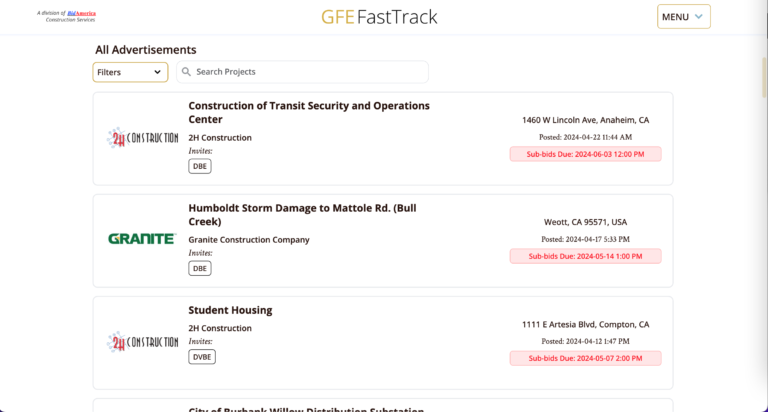
Approved Journal
BidAmerica’s GFE Outreach is a California approved online trade and focus publication journal.
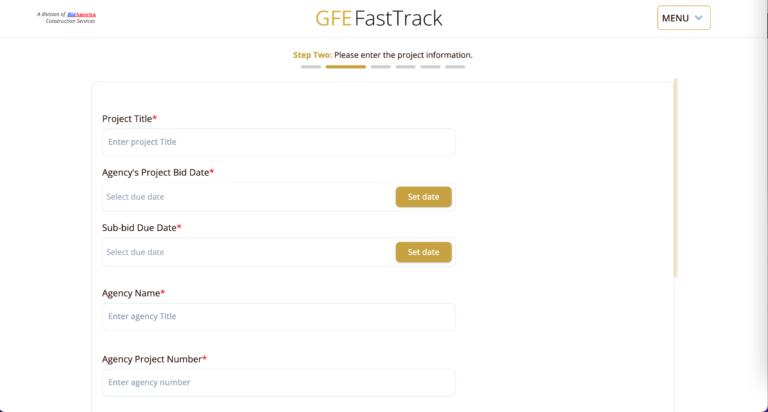
Easily Create Ads
Creating an advertisement is much more simple and intuitive. In just six short steps, you will have an ad published and public!
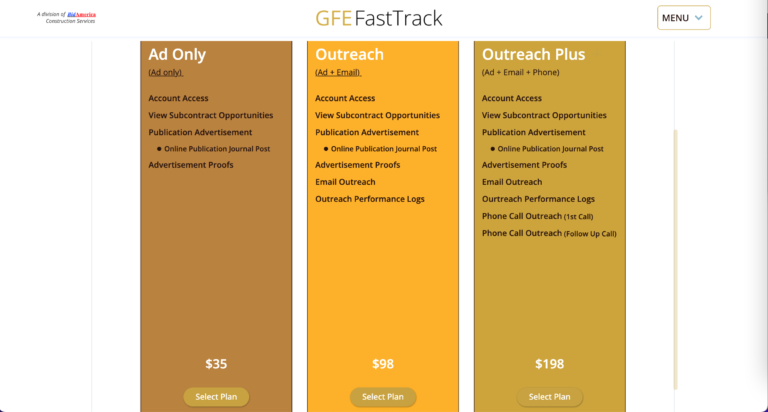
Outreach Done For You
Let us handle the outreach tasks such as emailing and calling! Choose one of our outreach plans when creating an advertisement and we will submit a full report back to you when the outreach is done.
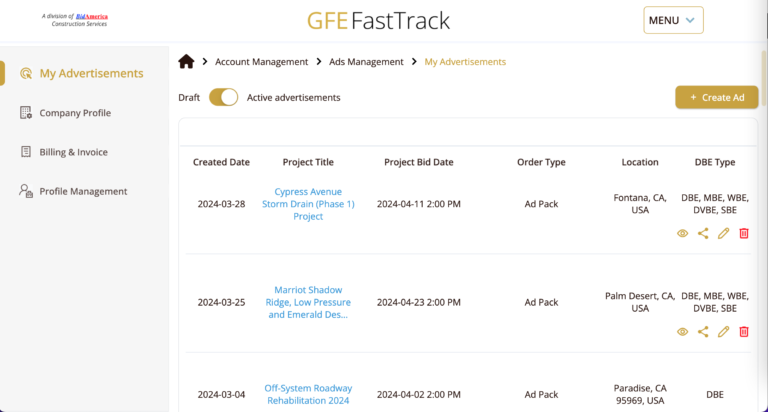
Ad Management
Both draft or published advertisements can be simply managed in your account. Edit, delete, or publish new advertisements in an easy to see dashboard.
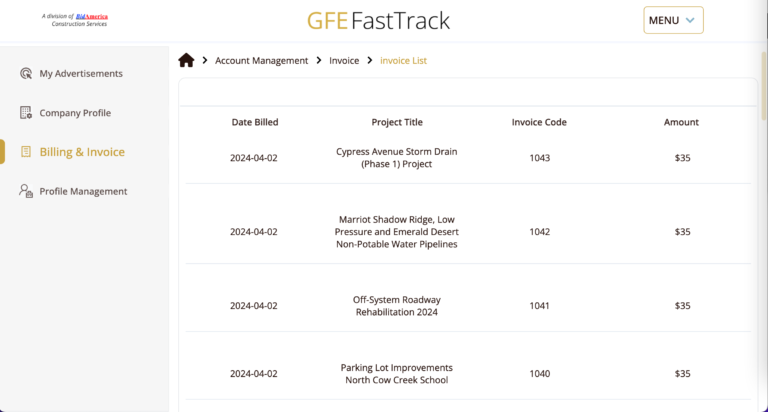
View Invoices
Access your past invoices through your account. Either print or download each invoice and keep record.

Get Started
Getting started is easy!
Simply create a new account by purchasing a Single Ad or subscribing to Unlimited Ads below. We'll greet you on the other side!
PRICING & Products
Choose Your Plan
Single Ad
(1x) Single Ad per order
$35
per advertisement
Single Published Advertisement
Single Proof of Advertisement
Manage & Edit My Advertisements
Publish Immediately in our Journal
Approved Trade & Focus Journal
Easy Setup Process
*Email and Phone Outreach Add-ons Available per Advertisement*
Unlimited Ads
Unlimited Ads per month
$59
per month
Everything in SINGLE AD plus...
Unlimited Monthly Advertisements
Unlimited Proof of Advertisements
Cancel Anytime
Save Money Publishing More Ads
*Email and Phone Outreach Add-ons Available per Advertisement*
OutreacH Add-Ons
For Single or Unlimited Ads
Complete Email Outreach: +$199
Email & Phone Outreach: +$299
Email Outreach (30+ DBEs)
Email Performance Logs
Phone Outreach (1st round)
Phone Outreach (2nd round)
Phone Performance Logs
Complete GFE Final Report
*Options are available during the advertisement creation process*

(951) 528-0528
Copyright © 2025, GFE Outreach
All rights reserved.
